
views
Ending Hunger Locally

Support organizations that distribute food. Food banks and charities need funding to stay open. Plus, they often rely on help from volunteers. Additionally, they can typically buy more food at a lower cost than you can, so donating funds to them directly may feed more people than buying food and donating it yourself. Talk to your local food bank or organizations who are helping those in need to find out the best way you can help. For instance, your local food bank may be able to feed more people with a $10 donation than they can with $10 of food you bought at the grocery store. As another example, offer to hand out food at the food bank, serve meals at the soup kitchen, or deliver food with you local Meals On Wheels program.
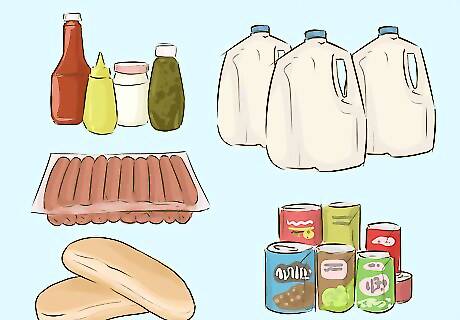
Donate food items to local organizations. Food banks and charities collect food donations and distribute them to those in need. Typically, you can donate canned foods, boxed foods, and fresh foods. Ask your local organization for what they need most. If you have a membership to a bulk foods store like Costco, this is a great place to pick up food for donating. You’ll get more food for your money and it tends to be the kind of easy to store items that work well for distributing to the needy. Local churches, soup kitchens, shelters, and even government organizations will take donations of food to redistribute to people who need help. Find one that matches up with who you’re looking to help.
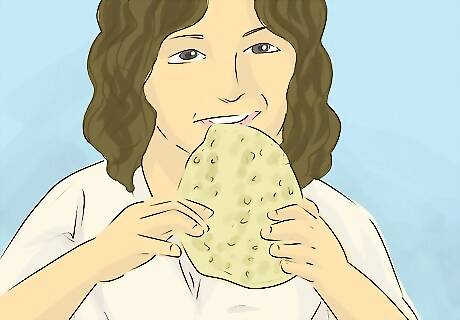
Take food directly to those in need. You don’t need to wait for a food shelter in order to distribute food items to people that you know are in need. Buy healthy food that doesn’t require anything to be prepared and take it to homeless people that you see in your daily activities. For example, buy a bunch of bananas and hand them out to the homeless people downtown. Another common demographic of people that go hungry are the elderly. Older people living on their own often have limited money and may not be capable of cooking very much for themselves any more. If you know someone who’s very old and might struggle making themselves a good dinner, offer to bring and have dinner with them every now and again. Good examples of foods to take include: sliced soft apples (like Gala), whole bananas, a portion of a loaf of whole grain bread, pop-open containers of tuna, soy nuts (bought in bulk, these a quite cheap and they contain a massive amount of nutrients in a very small serving), and pre-cut carrots (cut as thinly as possible).

Get your employer involved. Many businesses will do donation matching. Talk to your boss about getting your business involved if they aren’t already. This will mean that any money or goods you donate will be matched by your employer, effectively doubling the amount of good that you do.

Fight stereotypes by educating people about hunger. Some people believe the stereotype that people who are hungry aren't working hard enough. However, that's simply not true. There are many reasons why people need help, so be a voice for them. Educate the people you know about the various causes of hunger and why it's important to help people.
Ending Hunger Internationally

Research to find out what type of help is needed. Solving a big problem like world hunger can feel overwhelming, but there are a lot of resources to help you get started. Learn more about agencies and nonprofits who are already helping people in need. This will help you understand the best way for you to help. Here are some places to get started: Read about the United Nations World Food Programme to learn more about the hunger situation in the world. Visit Action Against Hunger's website to learn more about world hunger and how life-threatening hunger is treated and prevented. Check out the Bill and Melinda Gates Foundation to see how they're educating people about world hunger.
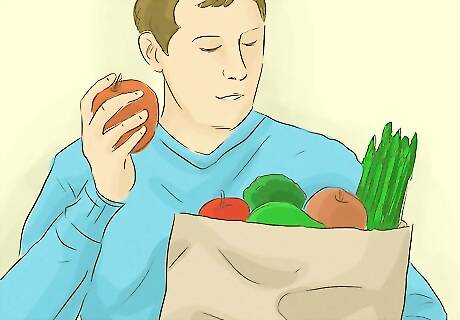
Don't buy foods that hurt the communities that grow them. When some products are bought in large amounts, it can actually harm the areas where those foods are grown. There are many reasons for this. Sometimes growing too much of the same thing is bad for the soil but farmers do it anyway because it's the only way to survive. Other times, it can deplete the amount of food available for the people in that region, if the crop had previously been used for locals. Either way, your best bet is to buy mainly local food and supplement your diet with these popular superfoods.
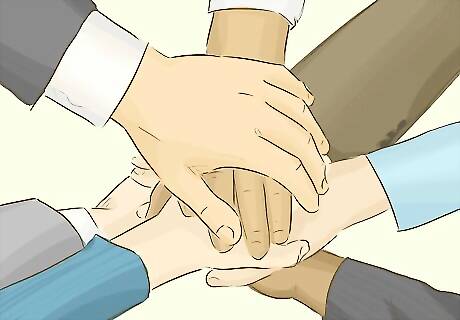
Donate to charities that have a proven record of helping those in need. Without donations from people like you, charities who help feed starving people won't have the resources to help. To make sure you're giving your money to the right charity, look for their financial statements online to see how they spend their donations. Additionally, check their ratings from independent charity watchdogs like Charity Navigator. Then, pick a charity that offers the type of help that you want to give, such as emergency relief or long-term community-based solutions for hunger. For example, your donations might save a malnourished child who's about to pass away, provide relief to farmers who lost their crop due to drought or extreme weather, lend money to women to help them support their children's health, and so much more. Read about each agency's programs. Action Against Hunger is a charity with 40 years of experience in preventing and treating hunger. Currently, they're helping 21 million people in 50 different countries. Using research and technical expertise, they partner with communities to create better ways of dealing with hunger. Another great charity is Heifer International, which donates farm animals to people who are coping with hunger. This allows them to produce their own food. You might also look into Charity: Water, which provides clean water to communities for drinking and cooking. Kiva is a microfinance organization through which you can make loans to entrepreneurs in the developing world, so they can grow their businesses. You can donate very small amounts and still make a difference. When you are repaid, you can lend the same money out to someone else.
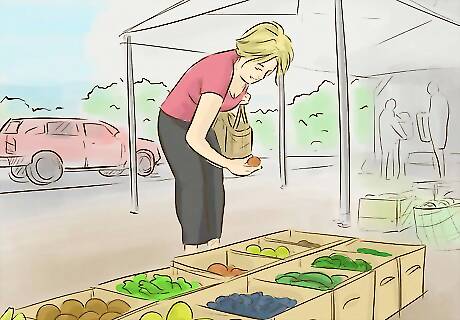
Buy Fair Trade so farmers are paid properly. Items marked Fair Trade with the international Fair Trade symbol are a great way for you to help feed other people while you eat. How? Fair trade items are bought from producers, like Guatemalan farmers, at a price that is fair for that region. It means that the company buying the goods also invests money in those communities to improve their lives, education, and access to supplies. This means that these people will have more money with which to buy things like food for their families. Buying a lot of items like this also sends a message to companies. As consumers, we can use our money as our voice. If enough people are buying these kinds of products, then more of them will be offered.
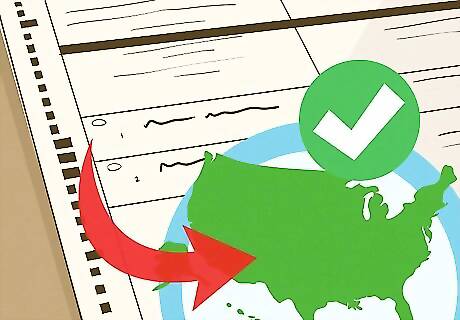
Support immigration reform to help migrant and undocumented workers. People who live in developing countries where it's hard to find work sometimes seek jobs in developed countries. Migrant workers have documentation that allows them to work in another country, while undocumented workers don't have paperwork. Typically, these individuals take low paying jobs that are hard to fill. Unfortunately, strict immigration laws can limit how much money they make, limiting their ability to feed themselves and their families. Here's how: Both migrant and undocumented workers may have trouble traveling back and forth over the border, as it's heavily guarded. This means they aren't able to support their families back home. The other problem is that strict immigration laws create a situation in which unscrupulous employers can pay undocumented workers low wages under the table, meaning that those people go hungry even though they work hard.
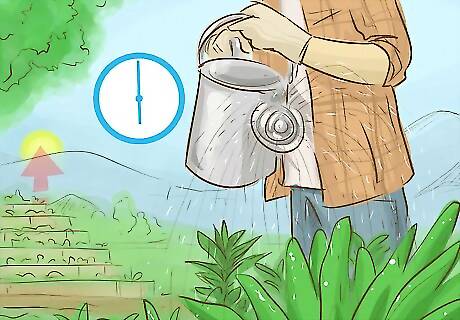
Use your skills to volunteer. If you have valuable skills, like knowledge of farm equipment, horticulture, construction, project management, or fundraising, donate your time. Organizations often want to do good work but lack the people with the necessary skills to help the communities they travel to. If you know how to do anything like this, taking a month to travel to a remote location and help set up a farm can be a huge help. Even if you don't have these skills, you can help with your money. Throw a fundraiser and donate that money to charities.

















Comments
0 comment